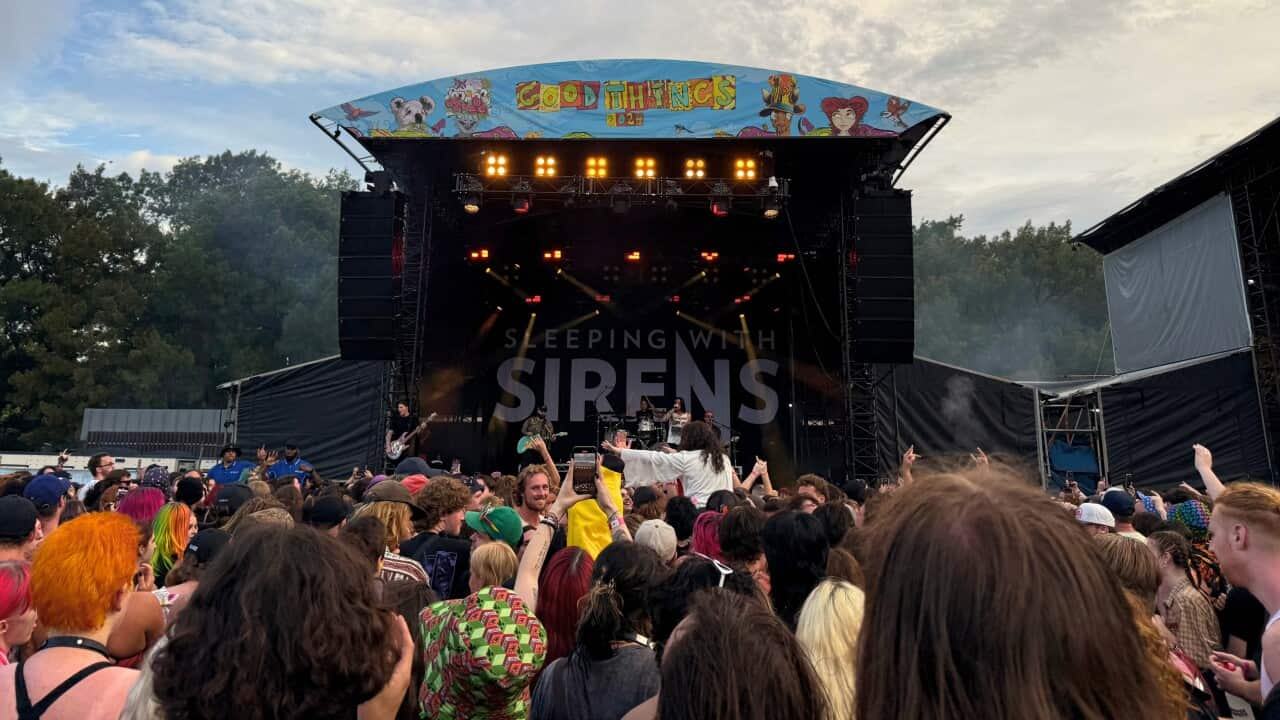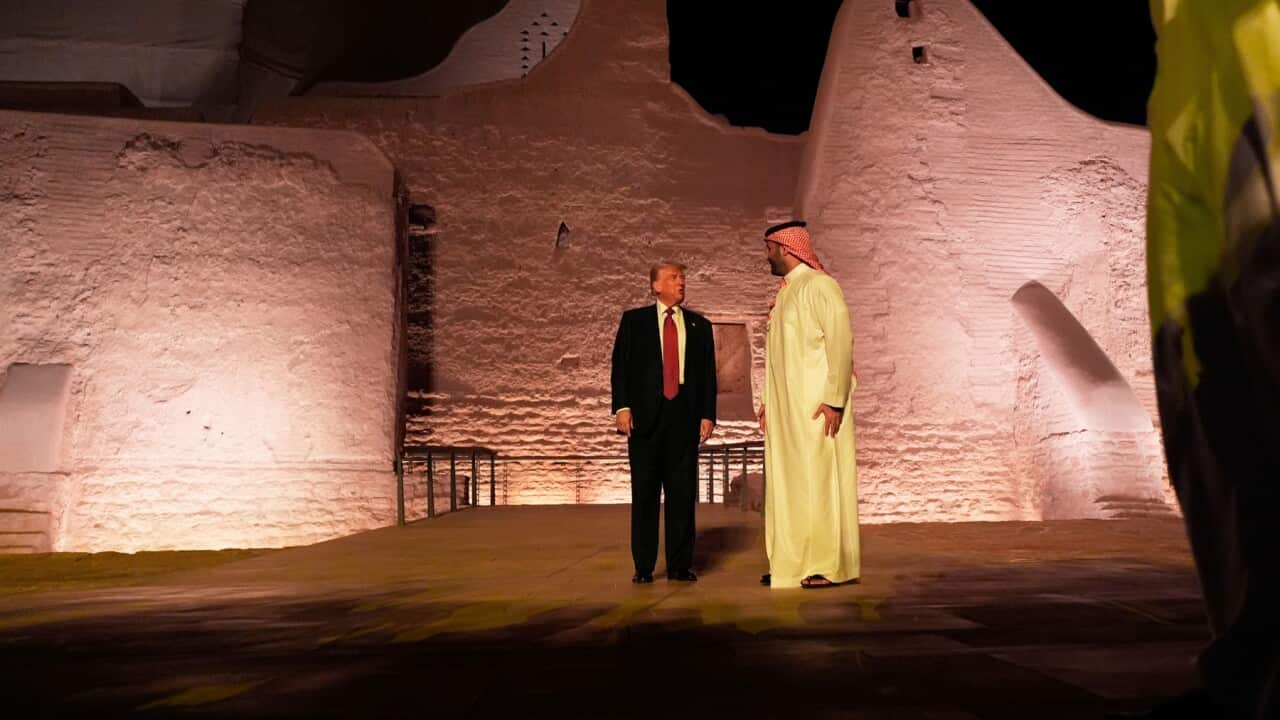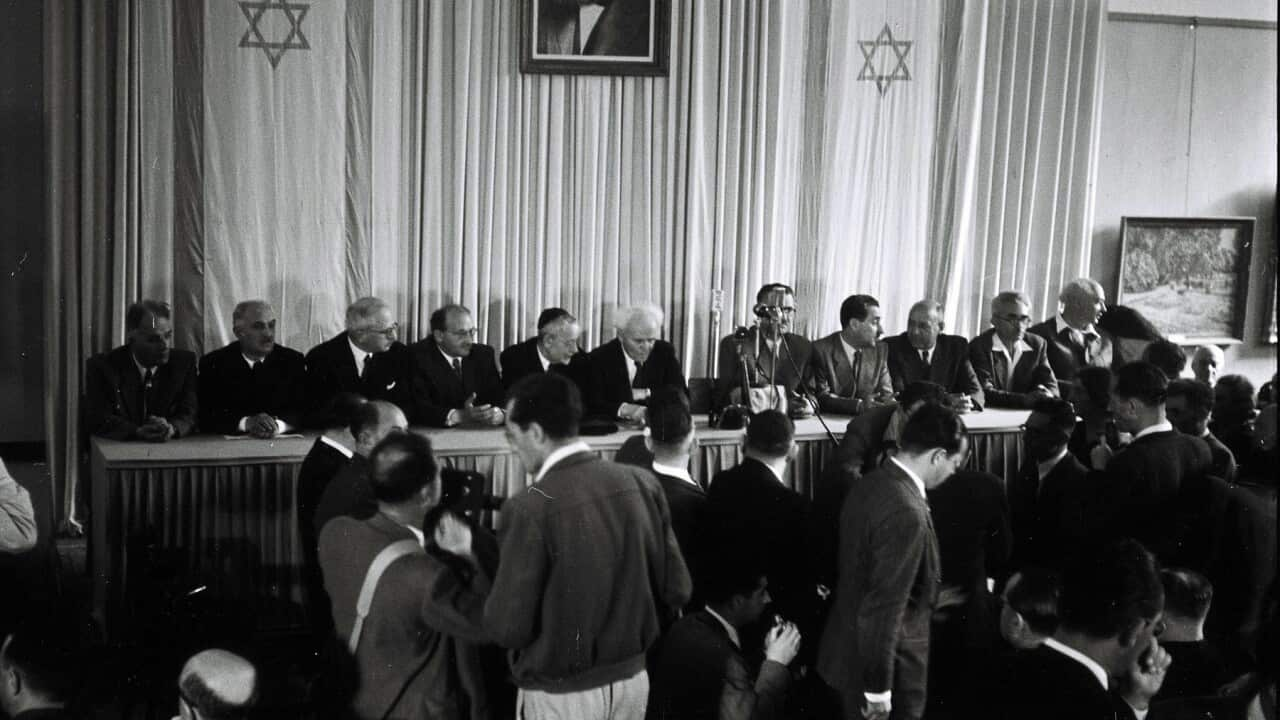TRANSCRIPT
It’s a bad day to hold a music festival.
Rain is pouring down as the punters arrive and there’s nowhere to escape the storm.
Once everyone’s socks, shoes, and clothes are soaked through, the weather switches on a dime ((suddenly changes)).
The sun beats down and it quickly reaches a swampy 30 degrees.
But all of that hasn’t deterred fans.
“It adds to the experience.”
"Are you still having fun in the rain?"
"So much fun.”
Around 30,000 people poured into Sydney's Centennial Park for the Good Things Festival.
The metal, punk, and alternative music festival is one of very few still going ahead in Australia.
In fact, of the 27 multi-city festivals that happened two years ago, just 11 are returning this financial year.
The mass cancellations led to a government inquiry to try to save the live music scene, with venues, festivals, and industry groups seeing increasing costs coupled with the cost of living crisis as some of the big challenges they’re facing.
“Almost every line item on the budgets we have, have gone through the roof. Production, staging, labour. Venue hire costs have gone up. Insurances have gone up. All our tour management and production management fees have gone up. Hotels go up. It's more expensive to get on flights. It's more expensive for our freighting.”
That's Chris O'Brien, promoter of Australia’s two remaining metal festivals - Good Things and Knotfest.
“We have to manage that, and then manage the ticket price and try and get it to a level where we think the punter will still happily pay but the festival can remain afloat and be financially successful, which is easier said than done.”
Although it’s been a challenge, the festivals are still managing to go ahead while many have been axed.
So, what makes metal different?
Heavy music is the reason Annie and Elke became best friends.
“We met in high school and she showed me a couple bands, and that's what united us together. We've been going to shows ever since.”
They, like many metal fans, feel it’s more than just music.
“It speaks to us, I think on a deeper level than, say, hip hop or something like that. The lyrics are so meaningful, a lot of people talk about how this type of music got them out of really dark time, depression, anxiety and whatever. And I think the fact that we can get to go and stand in a crowd with all these other people shouting the same words, we feel it.”
Jack, who’s at the festival with his friend Rhys [[reess]], says people find a community in the scene.
“You'd think they're the most hardcore people, and they're actually just giant softies, it's great. They're really excited just to meet new people who like what they like. They just want to connect with each other.”
Lochlan Watt is the lead vocalist of metal band Run, who hosted Triple J’s heavy music show The Racket for 13 years.
He says people interact with metal music differently.
“People don't have so much of a casual relationship with it. It becomes your identity and your community. Because it is such an important part of our lives and our identities, like people are happy to work to earn the money to pay to go to these events and support the bands that they love. It relies on us to survive, and I think we rely on it to survive.”
Josh Smith is a founding member of multi-ARIA award winning band Northlane, and a partner at Open Door Management.
He says there’s a real connection made through the music.
“The metal community's really tight, both with the artists and the fans. And, you know, metal fans will go to a lot of shows, and they'll buy a lot of merchandise, and they really care about the music that they're listening to. It's just a community that cares a lot about the music and is incredibly passionate, and they're not really fair-weather fans.”
Josh entered the industry at a turning point.
CD sales were plummeting as pirating music online became more common.
Now, streaming services are the go-to.
He says the way people consume music has changed the festivals.
“I have theory on this: I actually think that it relates to reduced listenership of Triple J. Radio used to play such an important part, and it's by and large being replaced by people listening to music on digital services like Spotify, who, you know, have algorithms that engineer what people listen to.”
In 2023, streaming services overtook radio as the most common way for people to consume music.
18-24 year olds are almost three times more likely to listen to streaming services than to music on the radio. [[according to the Australian Communication and Media Authority]]
While in the past, what was being broadcast - heavily influenced by the broadcasters of course - offered a good idea of what people wanted to see at a festival, Josh Smith says that’s no longer the case.
He says algorithms have narrowed music tastes.
“You're seeing that being reflected in lineups for festivals absolutely. Like there's no kind of large-scale, mixed bill festivals any more. They're all quite boutique and geared towards a certain demographic of people. I think the demographic of people that were interested in hard rock and metal music was always quite a significant part of the community. So we haven't really seen a decrease in attendance.”
Former Triple J host Lochlan Watt says the digital era has changed music.
“You don't really need to be curated to by someone so much. It's just much easier to go and curate your own tastes or have an algorithm do it for you.”
At Good Things Festival and most heavy music shows, Chris O’Brien says you'll see an eclectic mix of people.
“People that love heavy music genuinely, they are just music lovers. Accountants, lawyers, doctors, teachers, young kids, people in their 50s and 60s.”
The line-up is eclectic too.
Of the 16 main bands in the 2024 Good Things program, six released their first album before the year 2000.
The headliner, Korn, have been around since 1994.
“I need to make sure that there's enough variety in what we're booking, so that, you know, 16-year-old kids through to 60-year-old, people are happy.”
Josh Smith says that’s something special about the genre.
“It's hard to get 40, 50 year old people to buy a ticket to go to a music festival. Whereas, people at that age group that are huge metal fans, if one of their favourite all time artists is headlining a festival, they're probably not going to miss it.”
Not all metal festivals are thriving.
After running Destruct Agency for more than a decade, Matt Wale decided to produce his first music festival.
“The Australian metal scene has been very dominated by a few small players. And so, we thought it was time to give it our shot and deliver something as well.”
Borderline Destruction Festival travelled up Australia’s east coast in 2023, but it won’t be coming back this year.
Lochlan Watt says Australia has seen an influx of international tours since the borders reopened.
“It was like there was a backlog of bands that were wanting to get out here and tour internationally. And it just kind of feels like that since the damn wall broke, it just hasn't stopped flowing.”
Matt Wale says that’s forcing the smaller scene out.
“People have got to make a choice between, sometimes, between paying the rent and going out to a show, or going to a show that they really want to see an international that might only be here once every three years, versus the local lineup where there's something going on every weekend.”
But he believes there’s a place for both local and international acts.
“They are willing to make their own personal sacrifices to get to shows. And I think that's a testament to to our kind of scene in our genre. If the fans and the local scenes get around it, there's certainly a space for it.”
Lochlan Watt knows about sacrificing things for music.
“;I got in my band to a point where it was kind of skirting along the break even line. And then had a couple of lineup changes before the last tour that we did and had to rebook a bunch of flights and bunch of extra practices and things like that, and that just that just completely sank the potential of a break even on that one.”
It’s a common experience for local bands to go into debt for shows.
Matt Wale says without grassroots support you risk losing local acts.
“There's a saying that your favourite band was once a local band. And if it keeps trending this way, the ceiling that a band can reach is slowly coming down.”
Watt says there’s a silver lining to that.
“At least you know, that the people that are doing it and making it happen, the local bands, that are making the sacrifices to get out there and go on tour, really, really, actually want to be doing it.”
What was once a buffet of summer entertainment options in Australia now resembles something more like a school cafeteria.
Josh Smith says the broader industry could learn from the metal scene’s resourcefulness to survive.
“My industry is really good at making $1 go very far. We kind of really pride ourselves on fan driven experiences, and that's definitely the key to longevity and success in this world.”
Chris O’Brien says the choice of acts is the key to a successful festival.
“You’re making sure that there's at least four or five bands that people would love to see, and that gets them across the line, and then there's generally three or four other acts that they're interested in, and then they'll find new acts too that they've never heard of before.”
He also focuses on booking bands with a proven track record in Australia.
“All these acts have toured the country for quite a while. Sure, they're in different genres, but that they all got ticket selling histories that we know their fans will pay money to go and see them live.”
But for metal fans Annie and Elke, there’s nothing that will stop them from attending live music.
“Ever since COVID, like you, didn't even think that we'd ever get this opportunity ever again. So now that I see shows coming up, I always love to go."
"Plenty more to go - until we're 80 or 90 or 100.”













